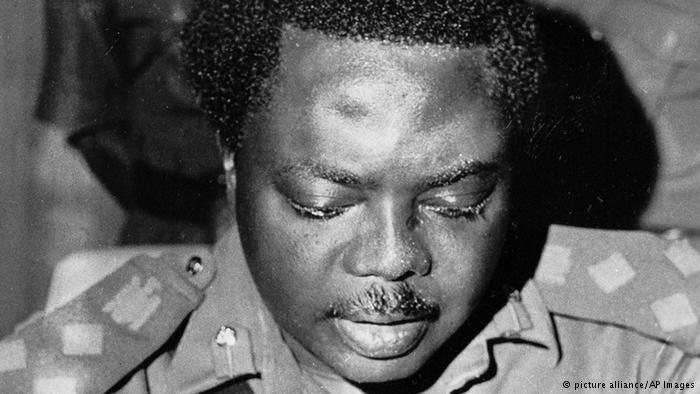Though seldom superstitious, I have not stopped wondering why Nigeria has suffered a misfortune in every “year 6” since its independence. My wonderment began in 1976 when Gen. Murtala Ramat Muhammed was murdered. I remember crying profusely on that February 13, after someone explained to me the meaning of the coup speech I had listened to on the radio.
All the negative occurrences that have retarded Nigeria’s progress and ruined its future started in “year 6” of each decade. For Nigeria, is it one decade one trouble? I believe the epochal events of 1966, 1976, 1986, 1996 and 2006 were Nigeria’s turning points. [Even the oil curse started in 1956 when oil was discovered in commercial quantity at Oloibiri in present-day Bayelsa State.] We must now pray for a positive turnaround in 2016!
The story of 1966 dominated conversations three weeks ago. The calamity brought by the first military coup and a counter-coup led to a civil war that killed at least 2million Nigerians. We need not repeat them but all are agreed that if the First Republic had not been truncated, Nigeria would have been a world power by now. The five majors committed an abomination!
What happened a decade later was equally atrocious: an agent of change, Gen. Murtala Muhammed, was assassinated by a habitual drunk named Lt. Col. B. S. Dimka. If Murtala had not been killed, likely, most of the leaders we have had would have been different. Yet, why did Dimka do it? He explained in a second speech, which he never had the chance to read on air before he was routed from the premises of Radio Nigeria in Ikoyi, Lagos: “Every honest Nigerian will agree with me that since the changeover of government there has not been any physical development in the whole country generally. All we have is arbitrary dismissal of innocent Nigerians who have contributed in no less amount to the building of this great nation. A professor was arrested, detained, dismissed and later taken to court on an article which every honest Nigerian will agree that all the points contained in that article were 100% truth. The sad point about it all is that those who initiated the retirement or dismissal exercise are the worst offenders…The Armed Forces promotion exercise is still fresh in your minds. Whatever reasons they have for the promotion, one can only say that they are ambitious. They in fact took over power to enrich themselves…We are convinced that some of the programmes announced for a return to civilian rule are made to favour a particular group. To mention only one: Maitama Sule is a politician but has been appointed chief of commissioners for complaints. This is to prepare him for the next political head at all cost. How many of you know that Maitama Sule is on a salary of N17, 000 per annum?”
Childish, wasn’t it?
A decade later (1986), Gen. Babangida was in charge. It was the year he introduced the Structural Adjustment Programme (SAP) with its main condiment, devaluation of the naira. The dollar jumped from N1 to N3 and then N10 within a month or so. A litre of petrol rose from 20kobo, I think, to 70kobo and then N5. We’re still waiting for all the promised advantages of SAP, devaluation, and diversification of the economy away from crude oil. That government opened the doors to 419ers of every description, culminating in the annulment of a presidential election.
There was another calamity 10 years later. In 1996, the plot for Gen. Sani Abacha’s self-succession was hatched. A constitutional conference he convened had finished its work and submitted its report. Abacha sat on it. By the time we started asking questions, all the existing five political parties had adopted him as their presidential candidate. In Nigeria!
Was there another trouble a decade later? Yes, a big one: Olusegun Obasanjo’s third term gambit. Mercifully, on May 16, 2006, the Nigerian Senate led by Ken Nnamani threw away the baby (constitution amendment) with the bath water (third term). Ostensibly in a bid to punish Nigerians for denying him a third term in office, Obasanjo imposed a sick Umaru Yar’Adua and Goodluck Jonathan on his party (PDP) and the nation. But for election rigging, I believe, Muhammadu Buhari would have emerged civilian president in 2003 or 2007.
Here we are in 2016. Will the jinx be broken this time round? Let’s hope no trouble will be triggered in 2016 to waste the next decade. Perhaps we have learned enough from history – perhaps this “year 6” will usher in a decade of peace and prosperity in Nigeria. However, the trouble I envisage this year is a further devaluation of the naira or a wrong handling of Boko Haram, Biafra and other agitators. Either mistake is sure to spell doom for the nation.
Lest I forget, I owe the title of this piece to Anezi Okoro’s novel One week, one trouble. The main character in the novel is Tagbo who is fond of getting into trouble each week. In Nigeria’s case, “Tagbo” is apt: it is Igbo for “Today-is-early”. If we learned to head off crises from today, a reform would be early enough. May Nigeria not be condemned to repeating history. That’s my prayer.
— By ANIEBO NWAMU
***











